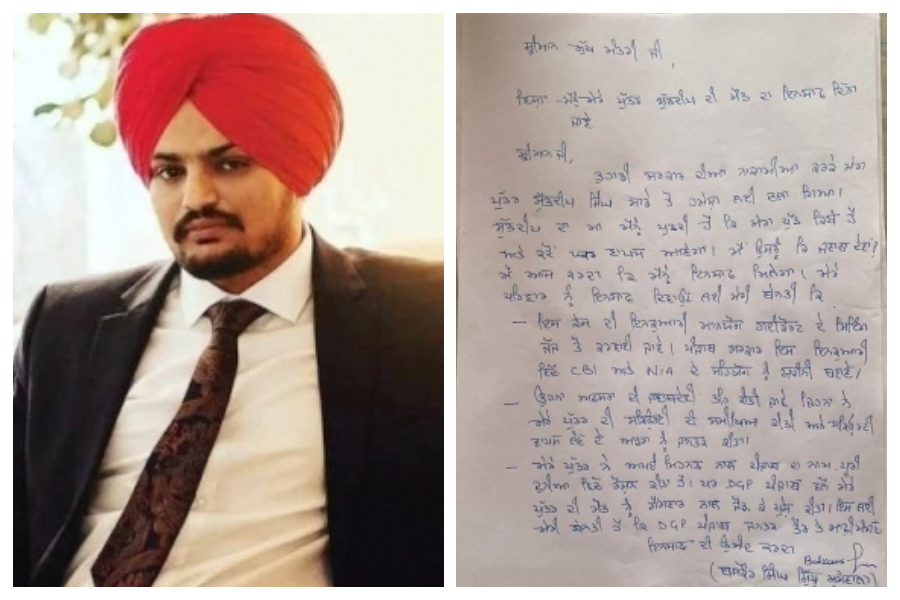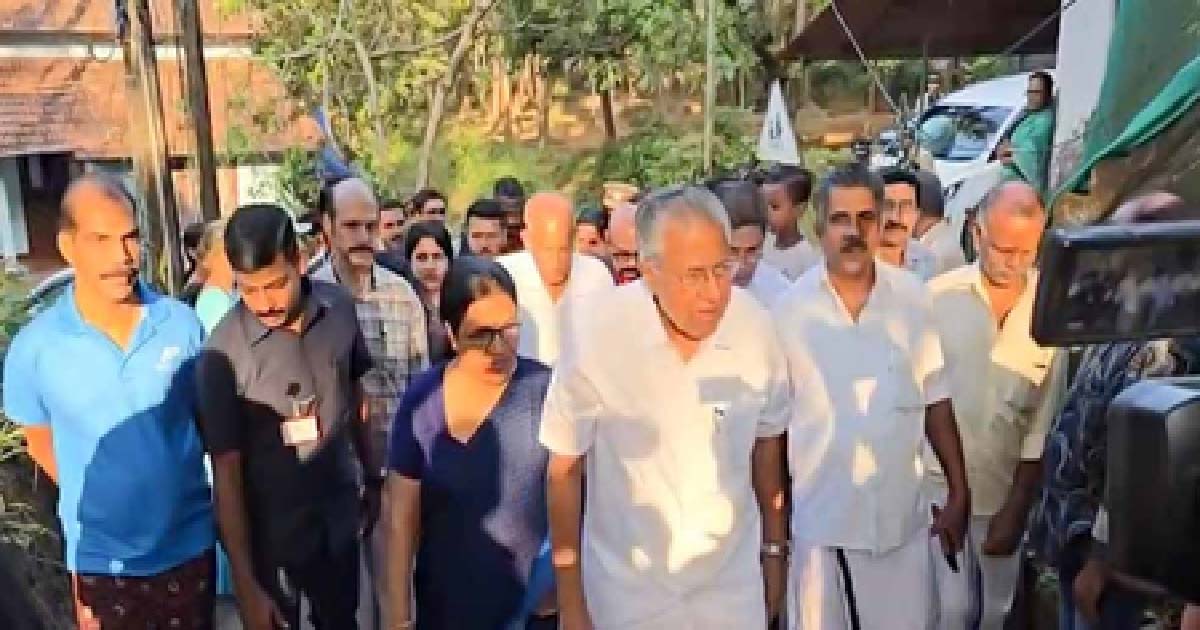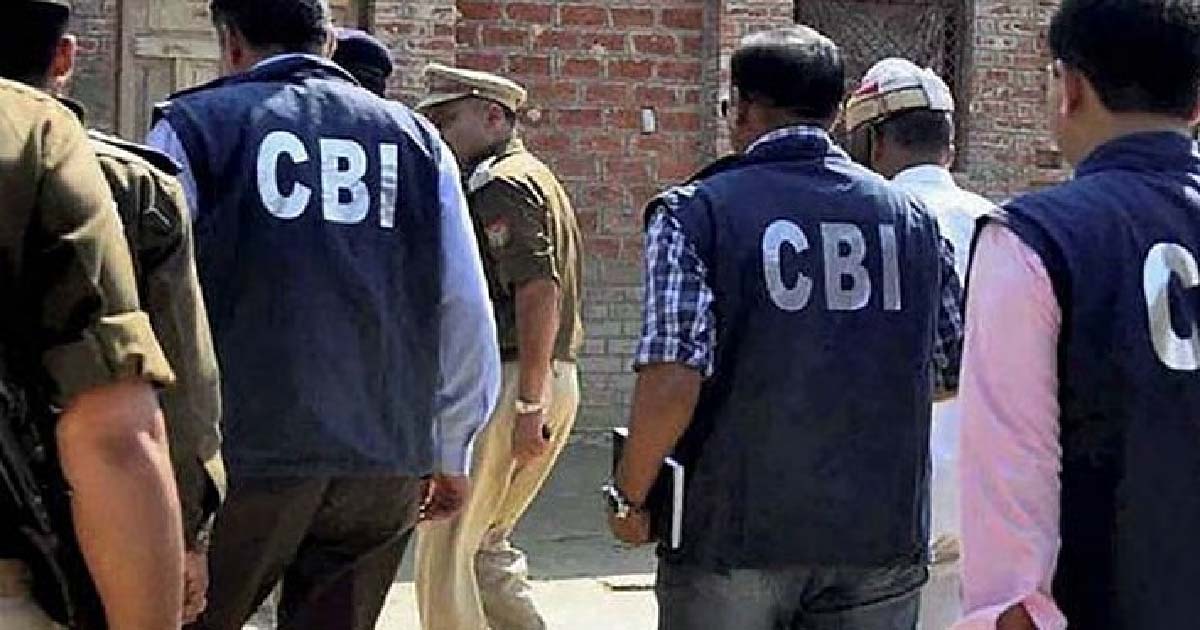Crime
Moosewala was threatened by gangsters: Slain singer’s father

Slain singer-turned-actor-politician Sidhu Moosewala’s father Balkaur Singh on Monday registered a complaint with the Punjab Police, saying the singer was threatened by gangsters over the phone.
Gangster Lawrence Bishnoi had threatened him many a times and that was why he had kept a bulletproof car, he said.
Accompanying two security personnel, Balkaur Singh said he was travelling in another car when he saw a sedan with four people on board intercepting Moosewala’s Thar vehicle.
“When the Thar reached near the outskirts of Jawaharke village, there was a white-coloured Bolero parked there with four youths occupying it. Soon, there was firing, and four youths in each Bullero and Corolla fled the spot.
“I reached the spot and raised an alarm. I took my son and both his friends to Mansa Civil Hospital, but couldn’t save him,” he said.
In a missive to Chief Minister Bhagwant Mann, the 29-year-old singer’s father demanded the killing of his son should either be investigated by a sitting High Court judge or by the National Investigation Agency (NIA).
Punjab Police have registered an FIR under charges of murder and the Arms Act.
Balkaur Singh also took exception to Director General of Police (DGP) V.K. Bhawra’s assertion that the killing of Moosewala, with a huge fan base running into millions, seems to be an inter-gang rivalry.
“Prima facie, it seems to be an inter-gang rivalry between the Lawrence Bishnoi group and the Lucky Patial group,” Bhawra told the media on Sunday.
“The Lawrence Bishnoi group has taken the responsibility of Sidhu Moosewala’s murder citing it be the retaliation to the killing of Vicky Midhukhera,” he said.
In less than 24 hours after his security was curtailed by the government, Moosewala was shot dead by gangsters close to his ancestral village in Mansa in broad daylight on Sunday, police said.
He was on the wheel in a Mahindra Thar SUV when the assailants, believed to be 10-12, fired more than 20 rounds at point-blank range at the singer and his two friends, who got grievous injuries. Moosewala got seven-eight bullets.
It is learnt that the AK-47 assault rifle was used in the crime as its shells were recovered from the crime scene.
The DGP said three shooters — Sunny, Anil Lath and Bholu, all residents of Haryana — have already been arrested by Delhi Police Special Cell in connection with the murder of Midhukhera, while, another accused identified as Shaganpreet, who was manager of Moosewala, was also nominated as accused in the FIR registered regarding the murder of Midhukhera.
Shaganpreet has escaped to Australia and is wanted by the police.
The police suspects that Moosewala killing was done to avenge the murder of Midhukhera, sources said.
Regarding the killing of Moosewala, the DGP said preliminary investigations revealed three weapons, including 7.62 mm, 9 mm and 0.30 bore weapons, were used in the crime. It is still under investigation, he added.
On the directions of Chief Minister Bhagwant Mann, a three-member Special Investigation Team (SIT) was constituted to ensure effective and speedy investigation of the murder of Shubhdeep Singh alias Sidhu Moosewala.
The SIT members include SP Investigation (Mansa) Dharamveer Singh, DSP Investigation (Bathinda) Vishawajeet Singh and CIA in-charge (Mansa) Prithipal Singh.
Moosewala, who left his house around 4.30 p.m. along with two persons — Gurwinder Singh and Gurpreet Singh (cousin) — was shot dead by some unidentified persons. Moosewala was driving his Mahindra Thar vehicle.
DGP Bhawra said when Moosewala reached Jawahar Ke village they were followed by a white Corolla and they were intercepted from the front by two cars, including a white Bolero and a dark grey Scorpio.
“There was heavy firing from the front on Sidhu Moosewala and his friends, where all sustained bullet injuries,” he said, adding that the police team reached the spot immediately and the trio were taken to the Civil Hospital in Mansa where Moosewala was declared brought dead, while his cousin and his friend are in stable condition and they have been referred to Patiala for further treatment.
On withdrawal of Moosewala’s security, the DGP said in view of Ghallughara week the police had temporarily withdrawn only two security personnel of Moosewala for law and order duty, while he had two police personnel from Commando Battalion deployed with him.
“While leaving home, Sidhu didn’t take along his two police personnel and also left his private bullet-proof car at home,” he said.
The DGP directed the IG (Bathinda range) Pradeep Yadav, the SSP (Mansa) Gaurav Toora and the SSP (Bathinda) J. Elanchezian to camp in Mansa, while the Additional DGP Law and Order has mobilised the required force to nab the murderers of Moosewala.
Crime
SC stays conviction of ex-NCP minister Manikrao Kokate in Nashik housing fraud

New Delhi, Dec 22: The Supreme Court on Monday stayed the conviction of senior Nationalist Congress Party (NCP) leader and former Maharashtra minister Manikrao Kokate in the 1995 Nashik housing fraud case.
A Bench of Chief Justice of India (CJI) Surya Kant and Justice Joymalya Bagchi issued notice to the Maharashtra government on Kokate’s plea challenging the refusal of the Bombay High Court to stay his conviction. Though it protected his membership in the Maharashtra Legislative Assembly, the apex court clarified that Kokate will not be allowed to exercise any governmental powers while the proceedings are pending.
“Issue notice. Meanwhile, the conviction of the petitioner shall remain stayed to the extent that there shall be no disqualification as a Member of the Legislative Assembly. However, no power shall be exercised by the petitioner,” the CJI Kant-led Bench ordered.
The relief from the top court comes days after the Bombay High Court had refused to stay Kokate’s conviction but suspended his two-year jail sentence and granted him protection from arrest as it heard his revision plea against the sessions court verdict.
Earlier, a Nashik sessions court had convicted Kokate in a case involving the illegal acquisition of government flats reserved under the Chief Minister’s quota and sentenced him to two years’ rigorous imprisonment along with a fine of Rs 50,000.
Following the sessions court verdict, Kokate was stripped of the Sports and Minority Affairs portfolios, and he resigned from the Maharashtra Cabinet. His resignation was accepted by Maharashtra Deputy Chief Minister and NCP chief Ajit Pawar amid a chorus from the Opposition.
The case against Kokate and his brother Vijay Kokate dates back to 1995 and pertains to the alleged misappropriation of flats meant for low-income individuals who do not own any other property.
The prosecution alleged that the brothers submitted forged affidavits and documents to acquire flats in the Nirman View Apartment at Canada Corner in Nashik. Investigations had also revealed that the brothers were using two additional flats in the same building that had been allotted to other beneficiaries.
Based on an inquiry by the district administration, Vishwanath Patil, then an official of the Urban Land Ceiling (ULC) department, lodged a complaint, following which a fraud case was registered at the Sarkarwada Police Station.
Since his induction into the Cabinet, Kokate has frequently courted controversy. He was earlier divested of the Agriculture portfolio following allegations that he was playing games on his mobile phone during a Legislative Council session.
Kokate denied the charge, but the episode drew widespread criticism. He also drew criticism for remarks on farmers and for attacking coalition partner BJP during a municipal campaign.
Crime
Kerala mob lynching case: CM Vijayan assures justice to family of Chhattisgarh man

Palakkad, Dec 22: Chief Minister Pinarayi Vijayan on Monday assured justice to the family of Ram Narayan, the migrant worker who was beaten to death by a mob at Attappallam in Walayar and said strict action would be taken against all those responsible for the crime that has shaken Kerala.
In a statement on Monday, the Chief Minister said a special investigation team led by the Palakkad Superintendent of Police is probing the case and has been directed to examine all aspects of the incident and initiate appropriate legal action.
The government will also consider the matter and ensure suitable compensation for the bereaved family.
Calling the incident unacceptable, CM Vijayan said such acts tarnish the image of Kerala as a progressive society and stressed the need for vigilance to prevent a recurrence.
The Chief Minister’s remarks came as disturbing details emerged from the remand report, which revealed the extreme cruelty inflicted on Ram Narayan, a native of Chhattisgarh who had come to Kerala in search of work.
According to the report, the accused assaulted him with a clear and conscious intent to kill, subjecting him to hours of sustained violence.
Medical findings recorded ahead of the post-mortem showed more than 40 injuries across the body.
Severe head injuries, profuse bleeding and multiple grievous wounds were cited as the cause of death.
Investigators said heavy sticks were used to beat the victim, while marks on the body indicate he was thrown to the ground, kicked repeatedly and dragged. X-ray examinations confirmed that he was stomped on his face and back, pointing to prolonged torture rather than a single attack.
The remand report also notes that those who attempted to intervene were threatened and driven away.
Meanwhile, Local Self-Government Minister M.B. Rajesh, who hails from Palakkad, alleged that the attack stemmed from hate-driven politics, claiming the victim was targeted after being branded a “Bangladeshi”.
He said the government stood firmly with the victim’s family and would ensure maximum punishment for the culprits.
Five accused have so far been arrested, all of whom have criminal antecedents.
Police said efforts are underway to trace more suspects as the investigation continues.
Crime
Mumbai: CBI Identifies 2 More In Mule Account Scam Involving Private Bank Manager

Mumbai: The CBI has identified two more persons allegedly involved in the case where agency officials arrested Nitesh Rai, branch manager of a private bank in Mumbai, last month for facilitating the opening of mule accounts. Investigation has revealed that the arrested official, in collusion with cybercriminals, accepted illegal gratification and, by abusing his official position, processed account opening forms, thereby creating channels for the movement and layering of cybercrime proceeds.
“During the investigation of the said case, from April 30, 2025 to May 4, 2025, it has been revealed that accused Nitesh Rai, while functioning as Branch Manager, Bandra Reclamation Branch, Mumbai, facilitated the opening of mule accounts and obtained illegal gratification from A.N. Pathan and P.B. Sahni for the improper performance of his official duties,” said a CBI official.
“Investigation has further revealed that on one occasion, a sum of Rs 10,000 was transferred into the Axis Bank account of Nitesh Rai on January 2, 2025, as illegal gratification in lieu of processing Account Opening Forms. The demand for illegal gratification and the work to be carried out thereafter were discussed by Nitesh Rai over WhatsApp chat with Sahni.”
“Pursuant to the demand, Sahni, through Pathan, arranged for the transfer of Rs 10,000 into the account of Nitesh Rai. The payment was facilitated through money exchange by Pathan. Upon receipt of the said illegal gratification, Nitesh Rai processed the Account Opening Forms.” “Pathan and Sahni thereby induced a public servant for improper performance of his official duties,” the official added.
-

 Crime3 years ago
Crime3 years agoClass 10 student jumps to death in Jaipur
-

 Maharashtra1 year ago
Maharashtra1 year agoMumbai Local Train Update: Central Railway’s New Timetable Comes Into Effect; Check Full List Of Revised Timings & Stations
-

 Maharashtra1 year ago
Maharashtra1 year agoMumbai To Go Toll-Free Tonight! Maharashtra Govt Announces Complete Toll Waiver For Light Motor Vehicles At All 5 Entry Points Of City
-

 Maharashtra1 year ago
Maharashtra1 year agoFalse photo of Imtiaz Jaleel’s rally, exposing the fooling conspiracy
-

 National News1 year ago
National News1 year agoMinistry of Railways rolls out Special Drive 4.0 with focus on digitisation, cleanliness, inclusiveness and grievance redressal
-

 Maharashtra1 year ago
Maharashtra1 year agoMaharashtra Elections 2024: Mumbai Metro & BEST Services Extended Till Midnight On Voting Day
-

 National News1 year ago
National News1 year agoJ&K: 4 Jawans Killed, 28 Injured After Bus Carrying BSF Personnel For Poll Duty Falls Into Gorge In Budgam; Terrifying Visuals Surface
-

 Crime1 year ago
Crime1 year agoBaba Siddique Murder: Mumbai Police Unable To Get Lawrence Bishnoi Custody Due To Home Ministry Order, Says Report












